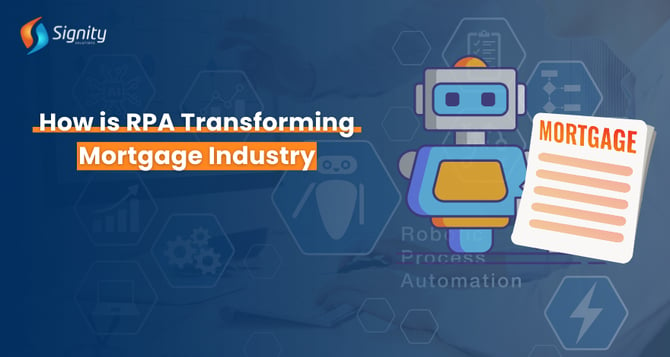How is RPA Transforming The Mortgage Industry?
Learn how RPA enhances operational efficiency, reduces processing times, and lowers costs, positioning mortgage companies to serve their customers better and stay competitive in a rapidly evolving market.

Introduction
Processing mortgage loans involves extensive paperwork and long waiting periods for document verification, leading to a tedious customer experience.
Automation, particularly RPA (robotic process automation), streamlines these routine tasks, allowing mortgage specialists to focus on the customer, lending process improvement, and handling tasks better suited to their experience and skills.
By implementing RPA in the mortgage industry, enterprises can significantly cut costs, combat fraud, and enhance their customer experience.
According to Precedence Research, The global robotic process automation market size was valued at USD 18.41 billion in 2023 and is expected to reach USD 178.55 billion by 2033.
Are you concerned about your mortgage firm's lagging?
Whether it is loan application processing, discharging the mortgage, or time-consuming data entry and manual processes, RPA implementation is the answer to all your concerns.
As a leading RPA consulting firm, we are dedicated to providing you with expert guidance and support to ensure a seamless and successful implementation of RPA in your mortgage operations.
Key Takeaways
- RPA streamlines loan applications, ensures fraud protection, aids in customer service, speeds up document processing, automates decision-making in underwriting, and facilitates compliance.
- Effective RPA software includes Optical Character Recognition (OCR), security and compliance controls, exception handling, error mitigation, and integration with Machine Learning and AI capabilities.
- Assess your firm's need for RPA by considering the volume of repetitive tasks, error rates, compliance challenges, and adaptability to dynamic workflows.
- Signity Solutions offers comprehensive RPA services which streamline processes in the mortgage industry.
Did you know that a recent study conducted by Sutherland with a leading mortgage firm found that RPA helps them speed up 20% of their processes through automation?
With RPA implementation in the mortgage industry, financial services providers experience higher customer satisfaction and reduced demands on mortgage lenders, creating a win-win situation for everyone.
Let’s understand how RPA helps you with your current challenges.
What Are The Benefits of Implementing RPA In The Mortgage Industry?
The mortgage industry has also been struggling with a few challenges in recent years, like delays in document processing and underwriting, compliance challenges, and cybersecurity threats.
Let us look at the ways in which RPA is transforming the mortgage industry.
1 ) Document Processing
Document processing is one of the major obstacles the mortgage industry faces. The process is usually very complex and involves a huge chunk of paperwork. Managing documents like loan applications, credit appraisals, and property reports takes up a lot of time and resources.
RPA Speeds Up Document Processing
RPA bots can automatically extract the relevant data from documents like loan applications, tax returns, and income tax statements. Based on a pre-set filter, like borrower name or the stage of the loan application process, an RPA software classifies the documents. The bots then tally the data against data from relevant sources, ensuring that the data is error-free and genuine.
2) Underwriting
Underwriting involves collecting and analyzing many documents, such as tax returns, employee verifications, and bank statements. It is also important to ensure that all the documents are complete. Manual underwriting is a very lengthy endeavor, and borrowers can miss out on many potential opportunities.
RPA Automates decision-making in underwriting
In the underwriting process, AI bots automate the entire decision-making process. In mortgage loan automation, RPA bots flag a file containing malicious content. To facilitate data exchange, the bots integrate with already existing systems like risk management tools. Since an RPA software documents every step of the underwriting process, it helps adhere to the existing compliance standards.
It is very important to upgrade the underwriting infrastructure without causing a huge change in the entire system. RPA bots also help with that.
3) Compliance
The mortgage industry faces obstacles at the federal, state, and local levels. In a manual mortgage processing system, keeping track of all the regulatory laws can be daunting. Moreover, managing documents like compliance certificates and credit reports manually can lead to errors.
RPA facilitates Compliance
The implementation of RPA in the mortgage industry is useful. It streamlines processes like data validation, regulatory reporting, and audit trail documentation. These collectively aid in regulatory compliance while increasing the accuracy of the processes. RPA bots also keep track of the data in real-time and help swiftly adapt to any change.
4)Customer service
In mortgage processing, the lenders need to pass on various important data to the borrower, like escrow statements and closing disclosures. With manual customer support, the security of such confidential data is compromised. The Consumer Financial Protection Bureau (CFPB) also ensures the resolution of complaints from the borrower’s end by the lender. This takes up a lot of time with manual customer support.
RPA Aids in Customer service
An RPA bot streamlines communication between different departments in a mortgage firm. The response time to customer queries is reduced significantly, and the customer service team can focus on more urgent queries. In addition, RPA bots automate repetitive tasks like data entry and verification of important documents.
5)Cybersecurity
There are always cyber security threats in paper-based record keeping and manual mortgage processing. The borrower needs to share certain confidential information with the lender, like notices of delinquency. With phone calls and other communication methods, the chances of data breaches and identity theft increase manyfold.
RPA Ensures Fraud Protection
RPA ensures security and scrutiny at every step. It can go through documents much faster than any human can, checking for discrepancies. This eliminates the risk of cybersecurity attacks or potential fraud. Once the RPA software is linked to advanced analytics, the patterns are monitored constantly, and any potential cybersecurity attack can be detected in real-time.
How RPA Streamlines the Loan-Application Process?
RPA streamlines the loan application process by automating data entry, which speeds up loan processing services, reduces demands on customer support,and ensures adherence to compliance standards.
Let us have a look at each of the points in detail:
Automated Data Entry
In the case of stages like document processing, underwriting, and loan application approval, RPA in mortgage processing automates the entire process. RPA bots make extensive use of advanced technologies like OCR (Optical Character Recognition) and tally the collected data against data from external sources. This ensures the correctness and genuineness of the data.
Faster Data Processing
RPA bots automate repetitive and mundane tasks like data entry, credit scoring, and document verification, speeding up the Loan application process in no time. They facilitate parallel data processing across multiple applications. Numerous data-related tasks are executed simultaneously, thereby saving time and resources. Depending on the volume of the data, RPA bots help upscale or scale down the process.
Customer service
The main aim of any customer support bot is to eliminate wait time. RPA bots do exactly that and a lot more. They eliminate human errors and inconsistency. RPA bots also help in the mortgage process by enabling email notifications, which solve borrowers' inquiries.
Adherence to compliance standards
A detailed audit trail of all movements in the loan application system is necessary. It ensures transparency and reliability throughout the process and also helps in regulatory audits. Certain internal policies and regulatory procedures exist, and RPA bots aid in adherence to these.
Recent advancements in RPA can greatly aid loan applications, similar to how businesses manage processes when attempting to qualify for SBA loans. Streamlining these actions using automation ensures that critical loan requirements and compliance needs are robustly met, offering a smoother application experience.
Now that we have understood how RPA software benefits your fintech firm let us look at some of the key features of efficient RPA software.
Features of a Good RPA Loan Processing Software
Let us look at each of these features in detail:
Optical Character Recognition (OCR)
Optical character recognition (OCR) technology allows the RPA bot to read and extract data from documents like PDFs, images, and files. Tools like Prepostseo utilize the same technology to accurately extract text from various documents. When it comes to digitizing paper-based documents like income tax statements and property appraisals, this technology is a blessing in disguise. It helps automate and safely scan the documents, converting them into a more readable form that ultimately facilitates mortgage loan automation.
Security and Compliance Controls
Mortgage data includes communication between the lender and the borrower, which contains a lot of sensitive information. A data leak will most likely lead to a cybersecurity attack. A good RPA software facilitates audit trails and encryption protocols. It will constantly monitor patterns and behaviors and also prevent unwanted access to the system.
Exception Handling
In the mortgage industry, compliance and authenticity are paramount. From bank statement verification to loan application to loan approval, RPA Bots streamline the most complex processes.
Along the way, there might be a few anomalies or exceptions, and exception-handling abilities act as a protective wall against those obstacles only. The implementation of RPA in the mortgage industry helps elevate efficiency by quickly detecting and categorizing anomalies like missing documents.
Error Mitigation
RPA in the mortgage industry handles a wide range of tasks, such as data entry, data analysis, extracting important data, and categorizing the data based on pre-set filters. Since RPA bots monitor the data in real time and aid in error detection, theta ensures that the processes adhere to global compliance standards. Another key feature of RPA software is that it detects and solves the issues, not letting them snowball into unmanageable scenarios.
Machine learning and Artificial intelligence
Machine learning and AI systems are designed to optimize lending practices. They scan and extract data from important documents like financial statements. Implementing RPA in the mortgage industry involves utilizing complex ML and AI elements. Previous loan information and borrower profiles are scrutinized easily, making assessing credit risk easy. This helps the lender determine whether the borrower is even eligible for a loan.
Integration APIs
By integrating APIs, RPA bots interact and engage with multiple platforms and access loan origination systems and regulatory databases. End-to-end processes like document processes are automated. API integrations also help RPA bots access updated data, helping them stay updated with the ever-changing business needs. The overall operations of the IRMS are streamlined. This is exactly how RPA improves mortgage processing efficiency.
Who Benefits from Mortgage Process Automation?
From C-level executives to the sales department, mortgage automation provides many benefits to every organization's employees. Let's see how!
C-Level Executives/Leadership
Automating the mortgage process not only ensures compliance but also elevates leadership. It generates data trails and a large amount of information. With this technology, leaders gain the confidence to make more informed decisions and take actions previously beyond their reach.
Customer Service Agents
Leveraging the information and databases generated through mortgage process automation, customer service departments can deliver instantaneous answers to customers. They have the capability to promptly update records and provide more tailored product recommendations, taking input from existing customer data.
Sales and Marketing Department
Sales and marketing teams can significantly enhance their effectiveness by gaining comprehensive insights into clients' product portfolios and improved risk assessments facilitated by mortgage process automation. This enables them to refine marketing strategies for greater impact and empowers sales teams to upsell more effectively by identifying products that would benefit clients.
Accounting and Finance Department
Automating the mortgage process generates clear data trails that showcase compliance and adherence to the dynamic landscape of rules and regulations in the mortgage industry. Should regulations change, it becomes swift and straightforward to make adjustments and request any necessary missing information or documentation.
Is RPA Suitable for Your Mortgage Firm?
To determine if RPA is the right fit, you need to evaluate your firm's needs by considering factors like the volume of repetitive processes, error rates, regulatory compliance challenges, and adaptability to dynamic workflows.
Below are a Few Questions you can Ask:
- Are there a lot of repetitive, rule-based processes at your firm?
- How many mortgage applications does your firm receive daily? A few hundred or more?
- Are there very frequent errors in your processes, decreasing overall efficiency?
- Does your firm sometimes find it difficult to comply with regulatory requirements such as Know Your Customer (KYC) and AML?
- Do you feel you would be getting a high ROI if you could manage the cost savings and potential risks associated with the processes?
- Do you think your firm should be more receptive when it comes to dynamic workflows and changing work environments?
If you answered “yes" to most of these questions, this is your cue to integrate automation into your financial processes. And for that, you need to get in touch with the best RPA development company.
A good RPA development firm will not only help you implement RPA in your firm but will also guide you through the various challenges and assist you in mitigating them.
How Signity Can Assist You in Mortgage Processing Automation?
When you contact an established RPA firm like Signity, you will learn about the various use cases and discover new ideas for improving organizational productivity.
By implementing RPA at your firm, you will witness a 59% reduction in expenses and an 86% growth in productivity.
Our RPA services start generating ROI for your firm within 3 months, improve compliance by 92%, mitigate human error, and improve overall organizational efficiency.
Want our RPA consultants to help you determine the right usage of automation in your current systems and processes? Contact us today to kick off your automation journey!
















